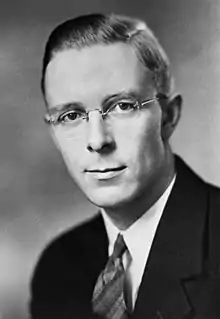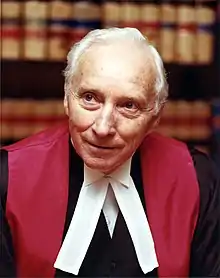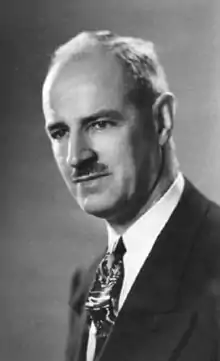1959 Alberta general election
The 1959 Alberta general election was the fourteenth general election for the Province of Alberta, Canada. It was held on June 18, 1959, to elect members of the Legislative Assembly of Alberta.
| |||||||||||||||||||||||||||||||||||||||||||||||||||||||||||||||||||||||||||||
65 seats in the Legislative Assembly of Alberta 33 seats were needed for a majority | |||||||||||||||||||||||||||||||||||||||||||||||||||||||||||||||||||||||||||||
|---|---|---|---|---|---|---|---|---|---|---|---|---|---|---|---|---|---|---|---|---|---|---|---|---|---|---|---|---|---|---|---|---|---|---|---|---|---|---|---|---|---|---|---|---|---|---|---|---|---|---|---|---|---|---|---|---|---|---|---|---|---|---|---|---|---|---|---|---|---|---|---|---|---|---|---|---|---|
| |||||||||||||||||||||||||||||||||||||||||||||||||||||||||||||||||||||||||||||
| |||||||||||||||||||||||||||||||||||||||||||||||||||||||||||||||||||||||||||||
Ernest C. Manning, in his fifth election as party leader and provincial premier, led the Social Credit Party to its seventh consecutive term in government, with 55% of the popular vote, and all but four of the sixty five seats in the legislature.
Social Credit was also helped by a split in the opposition vote: whereas in the 1955 election, opponents were largely united behind the Liberal Party, in this election the vote was divided between the Liberals and the resurgent Progressive Conservative Party under the leadership of Cam Kirby, won almost 15% of the popular vote, placing ahead of the Liberals whose leader, Grant MacEwan lost his Calgary seat. The Tories and Liberals each won only one seat in the legislature while the Alberta CCF was shut out of the legislature for the first time in seventeen years. The other two opposition seat were taken by a Coalition candidate in Banff and an Independent Social Credit-er, both with strong local support.
Previous to this election, the Social Credit government had done away with the Instant-runoff voting system in use in the rural constituencies, and the Single Transferable Vote system in Edmonton and Calgary, both of which had been in place since 1924. The move was made, the government claimed, to prevent the waste of votes caused by votes being declared spoiled due to unsatisfactory ballot marking, to bring Alberta in line with the other provinces who were using the First past the post systems, and to stop what the government called a conspiracy by the opposition parties to gang up on the SC government. The cancellation of STV and AV also standardized and simplified voting results across the province. Under single transferable vote and instant-runoff voting, final results would take up to five days to count the necessary vote transfers, before the last seat in a multiple-member district, Edmonton nor Calgary, was declared filled. (Manning always knew he was elected only hours after the polls closed due to his high vote count on the First Count.) The delay was especially large in the Edmonton, which elected seven members.
The 1955 election had produced a large opposition in the Legislature (large by Alberta standards anyway). Besides Liberals, Conservatives and CCF-ers electing MLAs in proportion to their numbers in the cities, the government had lost a few members in rural constituencies due to IRV, when they had received the largest portion of the vote in the constituency but were not elected to the seat due to another candidate receiving many votes (second choices votes) from a third candidate, who being last ranking had been eliminated. The cancellation of IRV system was meant to prevent this in the future.[1]
Simultaneous with cancellation of STV/AV, the government increased the number of MLAs by creating new districts, the most since 1909, mostly in Calgary and Edmonton (two districts). This allowed drastic re-drawing of district boundaries, allowing the government to suit itself.
The change was met by some harsh criticism at the time. The government was accused of changing the rules to help itself and for failing to consult the public, but it did not hurt the government's popularity at the polls.[2]
Results
| Party | Party Leader | # of candidates |
Seats | Popular Vote | |||||
|---|---|---|---|---|---|---|---|---|---|
| 1955 | Elected | % Change | # | % | % Change | ||||
| Social Credit | Ernest C. Manning | 64 | 37 | 61 | +64.9% | 230,283 | 55.69% | +9.27% | |
| Progressive Conservative | Cam Kirby | 60 | 3 | 1 | −66.7% | 98,730 | 23.88% | +14.69% | |
| Liberal | Grant MacEwan | 51 | 15 | 1 | −93.9% | 57,408 | 13.88% | −17.25% | |
| Independent Social Credit | 2 | 1 | 1 | - | 2,393 | 0.58% | −0.14% | ||
| Coalition | Frank Gainer | 1 | 1 | 1 | - | 2,279 | 0.55% | −0.66% | |
| Co-operative Commonwealth | Floyd Albin Johnson | 32 | 2 | - | −100% | 17,899 | 4.33% | −3.91% | |
| Independent | 2 | 1 | - | −100% | 3,640 | 0.88% | −0.25% | ||
| Labor–Progressive | 4 | - | - | - | 884 | 0.21% | −0.69% | ||
| Total | 216 | 61 | 65 | +6.6% | 413,516 | 100% | |||
| Source: Elections Alberta | |||||||||
Members elected
For complete electoral history, see individual districts.
See also
References
- Bob Hesketh, "The Abolition of Preferential voting in Alberta", Prairie Forum, Spring 1987
- Bob Hesketh, "The Abolition of Preferential voting in Alberta", Prairie Forum, Spring 1987


